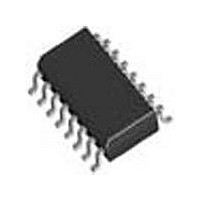LTC1063CS#PBF Linear Technology, LTC1063CS#PBF Datasheet - Page 11

LTC1063CS#PBF
Manufacturer Part Number
LTC1063CS#PBF
Description
Manufacturer
Linear Technology
Datasheet
1.LTC1063CSPBF.pdf
(16 pages)
Specifications of LTC1063CS#PBF
Architecture
Switched Capacitor
Order Filter (max)
5th
Single Supply Voltage (typ)
5/9/12/15V
Dual Supply Voltage (typ)
±3/±5V
Power Supply Requirement
Single/Dual
Single Supply Voltage (min)
4.75V
Single Supply Voltage (max)
16V
Dual Supply Voltage (min)
±2.375V
Dual Supply Voltage (max)
±8V
Operating Temperature (min)
-40C
Operating Temperature (max)
85C
Filter Type
Low Pass Filter
Lead Free Status / RoHS Status
Compliant
Available stocks
Company
Part Number
Manufacturer
Quantity
Price
APPLICATIO S I FOR ATIO
noise ratio at a given distortion level. The wideband noise
(µV
frequency and excludes the clock feedthrough. The
LTC1063’s typical wideband noise is 95µV
shows the same scope photo as Figure 8 but with a more
sensitive vertical scale: The clock feedthrough is imbed-
ded in the filter’s wideband noise. The peak-to-peak
wideband noise of the filter can be clearly seen; it is
approximately 500µV
95µV
factor or 5.25.
RMS
RMS
Figure 9. LTC1063 Output Clock Feedthrough + Noise
Figure 8. LTC1063 Output Clock Feedthrough + Noise
) is nearly independent of the value of the clock
f
f
CLK
CLK
wideband noise of the part, multiplied by a crest
= 100kHz, f
= 100kHz, f
C
C
= 1kHz, V
U
= 1kHz, V
P-P
. Note that 500µV
S
S
U
= ±5V, 1MHz SCOPE BW
= ±5V, 1MHz SCOPE BW
2µs/DIV
2µs/DIV
W
P-P
RMS
1063 F09
U
equals the
1063 F08
. Figure 9
Aliasing
Aliasing is an inherent phenomenon of sampled data filters
and it primarily occurs when the frequency of an input
signal approaches the sampling frequency. For the
LTC1063, an input signal whose frequency is in the range
of f
passband and stopband. Table 4 shows details.
Example:
An input RC can be used to attenuate incoming signals
close to the filter clock frequency (Figure 10). A Butterworth
passband response will be maintained if the value of the
input resistor follows Table 1.
Table 4. Aliasing Data
INPUT FREQUENCY
0.9995f
0.995 f
0.99 f
0.9875f
0.985 f
0.9825f
0.98 f
0.975 f
0.97 f
0.965 f
0.96 f
0.955 f
0.95 f
0.94 f
0.93 f
0.9
CLK
V
IN
±6% will generate an alias signal into the filter’s
f
CLK
CLK
CLK
CLK
CLK
CLK
CLK
CLK
CLK
CLK
CLK
CLK
CLK
CLK
CLK
CLK
0.1µF
Figure 10. Adding an Input Anti-Aliasing RC
V
–
R
C
LTC1063, f
f
f
IN
ALIAS
= (19.6kHz, 100mV
= (400Hz, 3.16mV
OUTPUT FREQUENCY
1
2
3
4
f
CLK
20
0.0005 f
0.005 f
0.01
0.0125 f
0.015 f
0.0175 f
0.02
0.025 f
0.03
0.035 f
0.04
0.045 f
0.05
0.06
0.07
0.1
CLK
≤
LTC1063
2πRC
= 20kHz, f
1
f
f
f
f
f
f
f
f
CLK
CLK
CLK
CLK
CLK
CLK
CLK
CLK
CLK
CLK
CLK
CLK
CLK
CLK
CLK
CLK
≤
f
CLK
10
8
7
6
5
RMS
f
V
CLK
RMS
OUT
C
OUTPUT AMPLITUDE
)
= 200kHz,
REFERENCED TO
)
LTC1063
INPUT SIGNAL
– 100.3 dB
– 17.7 dB
– 10.2 dB
– 24.3 dB
– 30
– 40
– 48
– 54.5 dB
– 60.4 dB
– 65.5 dB
– 70.16 dB
– 78.25 dB
– 85.3 dB
– 3
1063 F10
0.1µF
V
0
0
+
dB
dB
dB
dB
dB
dB
11
1063fa









